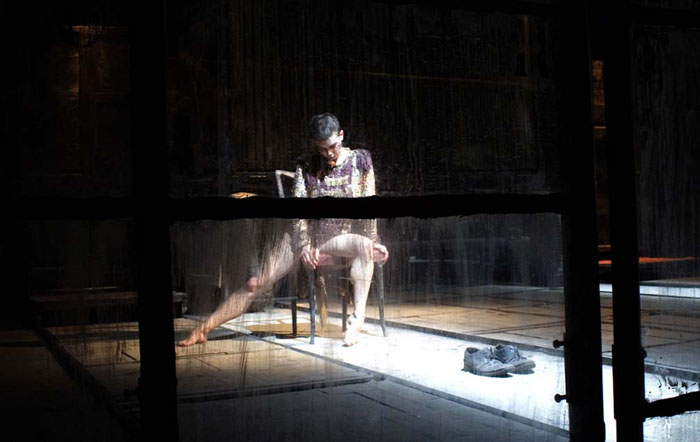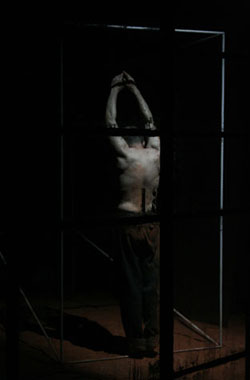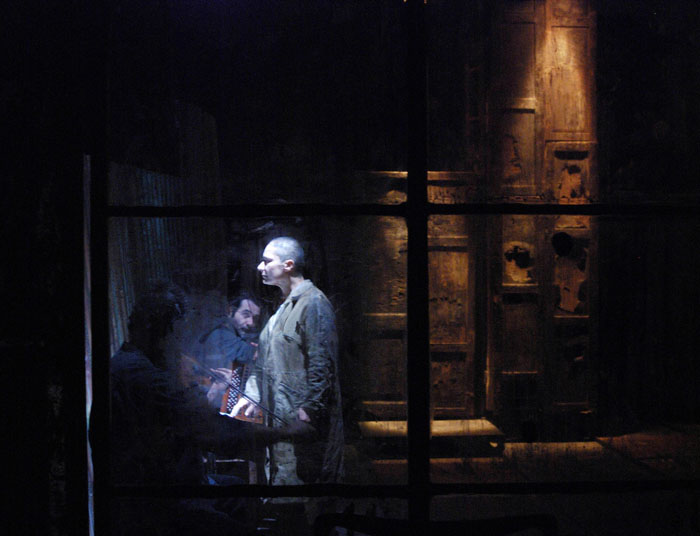

extracted from Werckmeister Harmoniak
Béla Tarr
le kell szögeznem, nem kétséges egy pillanatra sem, hogy ebben al esetben nem technikai, hanem jellegzetesen filozofiai kérdésröl van szó. Nevezetesen arról, hogy a szóban forgó hangrendszer kutatàsok révén, elkerülhetetlenül eljutunk egy bizonyos hitvizsgálatig amikor is föltesszük, mire alapozzuk abbèli meggyözödésünket, hogy az a harmonikus rend, amire minden remekmü, a maga megfellebezhetetlensègèben utal, lètezik-e egyáltálan...Ebböl következik, hogy voltakèpp nem is zenei kutatásokról, hanem egyetlen, zene ellenes elismerésröl, egy èvszàdok òta elkendõzött ès különösen kètsègbe ejtõ botrány, határozott leleplezèsèröl kell beszèlnünk. A megszègyenitö helyzet ugyanis az, hogy több èvszazad mestermüveinek minden egyes hangzata, velejèig hamis…..
(text played in Hungarian)
“Materia cani randagi” draws inspiration from the work of Carlo Michelstaedter. In particular, “Persuasion and rhetoric” lead us in the universe of the unfinished, of the interrupted movement, of the impossibility of finitude of the act of creation.
...“life would be if time did not move away from it its being constantly in the future ….the necessity of the escape in time implies the necessity of the expansion in space”.
The visions of the Hungarian director Bela Tarr are based on the work of the young Michelstaedter, who committed suicide in 1910 at the age of 23. At the moment, three of Bela Tarr’s works are a source of inspiration for us: Karhozat (1987), Satantango (Sátántangó1994), Werckmeister harmonies (Werckmeister Harmóniák, 2000).
The need for cohesion of action and space which features all the plays of Masque is, in this play, oriented to cinema, whose main features are visible in the landscape and foreground of the play.
But it is especially in the foreground that Masque expresses the peculiarity of its way of acting on the stage: Masque unites a foreground, typical of cinema, to a constant isolation of the character. The actors act following a logic which excludes the others. By avoiding intelligible relationships, this separation protects the play from taking a narrative connotation and enables the public to create new relationships.
I must insist that we cannot doubt even for a moment on the fact that we are not dealing with a technical issue, but with an utterly philosophical one.
After our researches on the field of tonal system, we are inevitably in the position to review our arguments. We need to ask ourselves: What is our opinion based on? As a consequence, we should not talk specifically about musical researches, but about the acknowledgement of a non-musical issue, that is the undeniable revelation of a scandal which has been accepted for hundreds of years, which is discouraging. The disgusting thing is that music masterpieces have been composed for hundreds of years using completely fake chords. This means that the unsurpassed magic, made of assonances and chords, is in fact based on deception. Yes, without any doubt we are talking about real deception. Though the insecure ones chatter about compromise, in order to tone down this statement.
There is no compromise at all, when the majority argues that the pure musical tone is only an illusion. According to them pure musical chords do not exist.
It is time to draw everybody’s attention on the fact that there have been luckier times than ours. For example the one of Pythagoras and Aristoxenus, when our ancestors used to play musical instruments which were tuned in a natural way.
They were happy with playing in a few tones only, because they were not troubled by doubts. They knew that the divine harmony belonged to the gods only.
Later all this wasn’t worth a fig anymore, because the confused presumption stole all the divine harmony.More or less this succeeded as the issue was passed to technicians. The first one was Pretorius, then Salinas and finally Andreas Werckmeister, who simply fulfilled his task by dividing the divine octave system in twelve parts. One semitone out of two is artificial. He used only five black keys instead of ten and sealed the situation.
We should also consider the development of instruments tuning, the so called uniform temperament and its sad story, and then reintroduce the right to a natural tuning. We need to correct Werckmeister’s mistakes carefully. We need to face those seven notes, not by seeing them as a single octave, but as seven different ones with different qualities, as seven sisters on the vault of heaven. This is what we should do. But we should also agree that the natural tuning has limits, for example the very serious one which excludes the use of tones in the highest music keys.
| Béla Tarr > Filmografia | ||
| Perdizione | ||
| Sátántangó | ||
| Le Armonie di Werckmeister | ||
Lo spazio oscura il tempo. I paesaggi della tragedia. Angelo Signorelli. |
||
